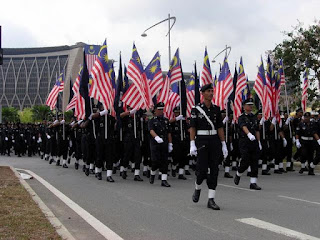RICHARD BAKER AND NICK
MCKENZIE
May 26, 2010
CORRUPTION
investigations have begun in Britain, Indonesia and Malaysia into alleged bribery
by the Reserve Bank of Australia's currency printing subsidiaries, as calls
grow for the federal government to hold a public inquiry.
Details of
the investigations come after the RBA yesterday released a statement saying it
''condemns corrupt behaviour'' and took recent revelations about its
subsidiaries' alleged willingness to pay bribes and supply prostitutes to
foreign officials ''very seriously''.
Federal
backbencher Kelvin Thomson has become the first Labor MP to break the
government's year-long silence over the affair, saying a public inquiry may be
necessary to remove a ''stain on Australia's reputation''.
Australian
Federal Police commissioner Tony Negus told a Senate committee yesterday that
he had 20 investigators in several countries working on the probe into alleged
corruption by Securency International, a firm half-owned by the RBA, which
exports polymer banknotes.
Securency
and its sister company, Note Printing Australia, are under scrutiny for paying
more than $US50 million to middlemen in corruption-prone countries after they
were awarded note printing and supply contracts by foreign central banks.
Mr Negus
said Britain's Serious Fraud Office was involved in the Securency investigation
as some of the company's top executives and well-paid middlemen were based in
London.
He
revealed the Australian Crime Commission had been involved in the case and admitted
the AFP ''could have done more'' to act on an initial complaint from a
Securency employee in 2008.
The AFP
probe did not begin until a year later after The Age
exposed concerns about Securency's dealings in Africa and Asia.
Mr Negus
was reluctant to answer many questions.
The Age
can also confirm anti-corruption authorities in Indonesia and Malaysia are
examining deals involving middlemen hired by the RBA firms to win contracts in
both countries.
Indonesia's
Corruption Eradication Commission has for at least two years been investigating
deals involving Jakarta businessman Radius Christanto - who the RBA firms hired
to help win contracts - and the country's central bank, Bank Indonesia, and
state-owned currency printer, Perum Peruri.
''We know
the core of the case now and preliminary findings show an element of corruption
and bribery,'' Indonesian corruption commission spokesman Johan Budi said.
It was
reported this week that Securency and NPA agreed to pay Mr Christanto a $US3.65
million commission after he helped win a 1999 contract to print 100,000-rupiah
banknotes for Bank Indonesia.
Correspondence
from Mr Christanto in 1999 suggests two other men believed to be Indonesian
central bank officials were to receive $US1.3 million in bribes from Securency
and NPA.
Malaysia's
Anti-Corruption Commission is helping the AFP trace what happened to the $4
million Securency paid its Malaysia agent Abdul Kayum Syed Ahmad after winning
a 2004 currency printing contract.
AFP agents
are to go to Malaysia to work with anti-corruption investigators. Mr Kayum is
believed to be closely linked to Malaysia's ruling UMNO political party and
government figures.
Mr Thomson
yesterday said: ''The AWB oil-for-food scandal put a stain on Australia's
international reputation by suggesting Australia was prepared to pay bribes and
kickbacks to advance our international business interests. The Securency
scandal has regrettably reinforced this impression.
''There
needs to be action - either by the AFP or from a public inquiry - to make it
clear to the world that we do not regard the payment of bribes, kickbacks or
commissions as an acceptable way to promote our exports,'' he said.
Greens
leader Bob Brown and independent senator Nick Xenophon have also called for a
public inquiry.
With ROFFIE
NDAOT
























